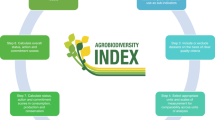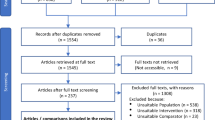Abstract
The principles of agroecology do not explicitly state a link with nutrition. Yet, we argue that among them, input reduction, biodiversity, economic diversification, social values and diets, fairness, connectivity and participation are directly linked to nutrition. Nutrition can serve as a critical outcome and driver of agroecological practices and can drive transformative change across the food system.
This is a preview of subscription content, access via your institution
Access options
Access Nature and 54 other Nature Portfolio journals
Get Nature+, our best-value online-access subscription
$29.99 / 30 days
cancel any time
Subscribe to this journal
Receive 12 digital issues and online access to articles
$119.00 per year
only $9.92 per issue
Buy this article
- Purchase on Springer Link
- Instant access to full article PDF
Prices may be subject to local taxes which are calculated during checkout




Similar content being viewed by others
References
IPCC Climate Change 2022: Impacts, Adaptation and Vulnerability (eds Pörtner, H.-O. et al.) (Cambridge Univ. Press, 2022).
Building a Common Vision for Sustainable Food and Agriculture: Principles and Approaches (FAO, 2014).
De Schutter, O. Report of the Special Rapporteur on the Right to Food, Olivier De Schutter - Final Report: The Transformative Potential of the Right to Food (UN Human Rights Council, 2014).
Bezner Kerr, R. et al. Can agroecology improve food security and nutrition? A review. Glob. Food Sec. 29, 100540 (2021).
Jones, A. D. et al. Farm-level agricultural biodiversity in the Peruvian Andes is associated with greater odds of women achieving a minimally diverse and micronutrient adequate diet. J. Nutr. 148, 1625–1637 (2018).
Ickowitz, A. et al. Agricultural intensification, dietary diversity, and markets in the global food security narrative. Glob. Food Sec. 20, 9–16 (2019).
Talukder, A. et al. Increasing the production and consumption of vitamin A-rich fruits and vegetables: lessons learned in taking the Bangladesh homestead gardening programme to a national scale. Food Nutr. Bull. 21, 165–172 (2000).
Bellon, M. R., Ntandou-Bouzitou, G. D. & Caracciolo, F. On-farm diversity and market participation are positively associated with dietary diversity of rural mothers in southern benin, West Africa. PLoS ONE 11, e0162535 (2016).
Bezner Kerr, R. et al. in Sustainable Diets: Linking Nutrition and Food Systems 53–63 (eds Burlingame, B. & Dernini, S.) (CABI, 2019).
Wezel, A. et al. Agroecological principles and elements and their implications for transitioning to sustainable food systems. A review. Agron. Sustain. Dev. 40, 40 (2020).
Agroecological and Other Innovative Approaches for Sustainable Agriculture and Food Systems That Enhance Food Security and Nutrition (HLPE, 2019).
Madsen, S. et al. Explaining the impact of agroecology on farm-level transitions to food security in Malawi. Food Sec. 13, 933–954 (2021).
Madsen, S. et al. Agroecological practices of legume residue management and crop diversification for improved smallholder food security, dietary diversity and sustainable land use in Malawi. Agroecol. Sustain. Food Syst. 45, 197–224 (2021).
Madsen, S. Farm-level pathways to food security: beyond missing markets and irrational peasants. Agric. Hum. Values 39, 135–150 (2022).
Jones, A. D. Critical review of the emerging research evidence on agricultural biodiversity, diet diversity, and nutritional status in low-and middle-income countries. Nutr. Rev. 75, 769–782 (2017).
Guidance on Mainstreaming Biodiversity for Nutrition and Health (World Health Organization, 2020).
Powell, B. et al. Improving diets with wild and cultivated biodiversity from across the landscape. Food Sec. 7, 535–554 (2015).
English, M. M. The chemical composition of free-range and conventionally-farmed eggs available to Canadians in rural Nova Scotia. PeerJ 9, e11357 (2021).
Kangmennaang, J. et al. Impact of a participatory agroecological development project on household wealth and food security in Malawi. Food Sec. 9, 561–576 (2017).
Bezner Kerr, R. et al. Participatory agroecological research on climate change adaptation improves smallholder farmer household food security and dietary diversity in Malawi. Agric. Ecosyst. Environ. 279, 109–121 (2019).
Bezner Kerr, R. et al. Repairing rifts or reproducing inequalities? Agroecology, food sovereignty, and gender justice in Malawi. J. Peasant Stud. 46, 1499–1518 (2019).
Trevilla Espinal, D. L. et al. Feminist agroecology: analyzing power relationships in food systems. Agroecol. Sustain. Food Syst. 45, 1029–1049 (2021).
Oliver, B. ‘The Earth gives us so much’: agroecology and rural women’s leadership in Uruguay. Cult. Agric. Food Environ. 38, 38–47 (2016).
Cetrone, H. et al. A participatory agroecological intervention reduces women’s risk of probable depression through improvements in food security in Singida, Tanzania. Curr. Dev. Nutr. 4, 819–819 (2020).
Benítez, B. et al. Empowering women and building sustainable food systems: a case study of Cuba’s local agricultural innovation project. Front. Sustain. Food Syst. 4, 554414 (2020).
Carvalho, L. M. & de Bógus, C. M. Gender and social justice in urban agriculture: the network of agroecological and peripheral female urban farmers from São Paulo. Soc. Sci. 9, 127 (2020).
Nyantakyi-Frimpong, H. et al. Agroecology and sustainable food systems: participatory research to improve food security among HIV-affected households in northern Malawi. Soc. Sci. Med. 164, 89–99 (2016).
Sylvester, O. & Little, M. ‘I came all this way to receive training, am I really going to be taught by a woman?’ Factors that support and hinder women’s participation in agroecology in Costa Rica. Agroecol. Sustain. Food Syst. 45, 957–980 (2021).
Bezner Kerr, R. et al. Human and social values in agroecology: a review. Elementa 10, 00090 (2022).
Deaconu, A., Mercille, G. & Batal, M. The agroecological farmer’s pathways from agriculture to nutrition: a practice-based case from Ecuador’s highlands. Ecol. Food Nutr. 58, 142–165 (2019).
April-Lalonde, G. et al. Characteristics and motivations of consumers of direct purchasing channels and the perceived barriers to alternative food purchase: a cross-sectional study in the Ecuadorian Andes. Sustainability 12, 6923 (2020).
Nagib, G. & Nakamura, A. C. Urban agriculture in the city of São Paulo: new spatial transformations and ongoing challenges to guarantee the production and consumption of healthy food. Glob. Food Sec. 26, 100378 (2020).
Deaconu, A. et al. Agroecology and nutritional health: a comparison of agroecological farmers and their neighbors in the Ecuadorian highlands. Food Policy 101, 102034 (2021).
Barrios, E. D. et al. Agroecology: Fostering Improved Access to Land and Natural Resources (World Agroforestry, 2019).
Frison, E. & Clément, C. The potential of diversified agroecological systems to deliver healthy outcomes: making the link between agriculture, food systems & health. Food Policy 96, 101851 (2020).
Doss, C. R. Designing agricultural technology for African women farmers: lessons from 25 years of experience. World Dev. 29, 2075–2092 (2001).
Bouwman, T., Andersson, J. & Giller, K. Herbicide induced hunger? Conservation agriculture, ganyu labour and rural poverty in central Malawi. J. Dev. Stud. 57, 244–263 (2021).
Dumont, A. M. & Baret, P. V. Why working conditions are a key issue of sustainability in agriculture? A comparison between agroecological, organic and conventional vegetable systems. J. Rural Stud. 56, 53–64 (2017).
McCune, N. et al. Peasant balances and agroecological scaling in Puerto Rican coffee farming. Agroecol. Sustain. Food Syst. 43, 810–826 (2019).
Picó, C. et al. Biomarkers of nutrition and health: new tools for new approaches. Nutrients 11, 1092 (2019).
TAPE: Tool for Agroecology Performance Evaluation: Process of Development and Guidelines for Application (Test Version) (FAO, 2019).
Mottet, A. et al. Assessing transitions to sustainable agricultural and food systems: a Tool For Agroecology Performance Evaluation (TAPE). Front. Sustain. Food Syst. 4, 252 (2020).
De la Peña, I., Garrett, J. & Gelli, A. Nutrition-Sensitive Value Chains from a Smallholder Perspective: A Framework for Project Design IFAD Report No. 30 (IFAD, 2018).
Bechoff, A. et al. The NUTRI-P-LOSS (Nutritional Postharvest Loss) Methodology: A Guide for Researchers and Practitioners (IMMANA, 2019).
Santoso, M. V. et al. A nutrition-sensitive agroecology intervention in rural Tanzania increases children’s dietary diversity and household food security but does not change child anthropometry: results from a cluster-randomized trial. J. Nutr. 151, 2010–2021 (2021).
Niggli, U., Sonnevelt, M. & Kummer, S. Pathways to Advance Agroecology for a Successful Transformation to Sustainable Food Systems (Univ. Bonn, 2021).
Brouwer, I. et al. Reverse thinking: taking a healthy diet perspective towards food systems transformations. Food Sec. 13, 1497–1523 (2021).
Brouwer, I. D., McDermott, J. & Ruben, R. Food systems everywhere: improving relevance in practice. Glob. Food Sec. 26, 100398 (2020).
Drexler, K. Government extension, agroecology, and sustainable food systems in Belize milpa communities: a socio-ecological systems approach. J. Agric. Food Syst. Commun. Dev. 9, 85–97 (2020).
Chappell, M. J. et al. Food sovereignty: an alternative paradigm for poverty reduction and biodiversity conservation in Latin America. F1000Res 2, 235 (2013).
Pinckaers, P. J. M. et al. The anabolic response to plant-based protein ingestion. Sports Med. 51, 59–74 (2021).
Drexler, K. Climate-smart adaptations and government extension partnerships for sustainable milpa farming systems in Mayan communities of southern Belize. Sustainability 13, 3040 (2021).
Semba, R. D. et al. Legumes as a sustainable source of protein in human diets. Glob. Food Sec. 28, 100520 (2021).
de Souza-Vilela, J., Andrew, N. & Ruhnke, I. Insect protein in animal nutrition. Anim. Prod. Sci. 59, 2029–2036 (2019).
Osmane, B. et al. Peas and beans as a protein feed for dairy cows. Agron. Res. 15, 2026–2038 (2017).
Madeira, M. S. et al. Microalgae as feed ingredients for livestock production and meat quality: a review. Livest. Sci. 205, 111–121 (2017).
Meena, R. S. et al. Legumes for Soil Health and Sustainable Management (Springer, 2018).
Nutrition and Food Systems (HLPE, 2017).
Food Losses and Waste in the Context of Sustainable Food Systems (HLPE, 2014).
Acknowledgements
We would like to thank C. Chigemezu Nwokoro, Scientific Officer at the Syngenta Foundation for Sustainable Agriculture and at ETH Zürich, for comments that greatly improved the manuscript.
Author information
Authors and Affiliations
Contributions
All authors contributed to the material and all authors reviewed the manuscript.
Corresponding author
Ethics declarations
Competing interests
E.I., M.P. and S.W. are employed by The Syngenta Foundation for Sustainable Agriculture, which is a separate legal entity from the company that provides its core funding. Apart from its Board Chair, the rest of its nine-person board are all independent of the company. All other authors declare no competing interests.
Peer review
Peer review information
Nature Food thanks Sera Young and the other, anonymous, reviewer(s) for their contribution to the peer review of this work.
Additional information
Publisher’s note Springer Nature remains neutral with regard to jurisdictional claims in published maps and institutional affiliations.
Rights and permissions
Springer Nature or its licensor (e.g. a society or other partner) holds exclusive rights to this article under a publishing agreement with the author(s) or other rightsholder(s); author self-archiving of the accepted manuscript version of this article is solely governed by the terms of such publishing agreement and applicable law.
About this article
Cite this article
van Zutphen, K.G., van den Berg, S., Gavin-Smith, B. et al. Nutrition as a driver and outcome of agroecology. Nat Food 3, 990–996 (2022). https://doi.org/10.1038/s43016-022-00631-7
Received:
Accepted:
Published:
Issue Date:
DOI: https://doi.org/10.1038/s43016-022-00631-7



